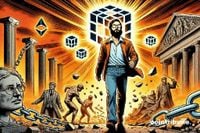In a rapidly evolving digital landscape, the integration of artificial intelligence (AI) and blockchain technology is paving the way for a more transparent and equitable financial system. As AI continues to enhance decision-making processes in finance, it simultaneously reveals significant biases that have long plagued the industry. Recent studies, including one from Lehigh University, highlight that OpenAI’s GPT-4 Turbo large language models exhibited a troubling pattern: applicants from certain demographics needed to achieve 120 credit points higher than their white counterparts to secure the same mortgage approval, despite identical income, credit histories, and debt levels. This bias is not confined to traditional finance; it also permeates decentralized finance (DeFi) and the broader cryptocurrency ecosystem.
The financial AI sector has shown immense potential, offering rapid, data-driven insights that can optimize investments, lending, and risk management. However, the reliance on historical data can lead AI-powered systems to overreact to market anomalies, particularly in the volatile cryptocurrency markets, which are susceptible to unpredictable events like the collapses of Terra and FTX. The challenge lies in the opaque nature of many AI systems, often referred to as black boxes, which lack the transparency necessary for users to understand decision-making processes.
To address these issues, experts are advocating for the integration of blockchain technology with Explainable AI (XAI). This combination promises to enhance transparency and accountability, providing immutable records of AI decision-making processes. Blockchain's decentralized nature ensures that no single entity controls the data, fostering trust among users. For instance, FICO, a leading credit scoring company, has successfully employed blockchain to log AI model decisions, allowing regulators to trace how credit approvals are determined. This innovative approach earned FICO the "Tech of the Future—Blockchain and Tokenisation" award at the Banking Tech Awards in London last year.
The potential for blockchain and AI integration extends beyond regulatory compliance. By embedding fairness and transparency into AI models, these technologies can revolutionize how decisions are made in the financial sector. For example, using XAI to explain voting processes within decentralized autonomous organizations (DAOs) can empower users to understand the implications of their choices better. Furthermore, combining XAI with blockchain could lead to effective risk assessment tools in lending protocols, enhancing user trust and engagement.
As the blockchain market is projected to grow from USD 3.0 billion in 2020 to USD 39.7 billion by 2025, at a compound annual growth rate (CAGR) of 67.3%, the convergence of AI and blockchain presents a unique opportunity for innovation. The integration of these technologies could establish a new standard for fairness and accountability in financial systems, addressing long-standing biases and inefficiencies.
In the gaming sector, a novel experiment in blockchain technology is unfolding with the launch of Chunked, a fully on-chain clone of Minecraft operating on the Somnia test network. Developed by MSquared, a division of the metaverse technology builder Improbable, Chunked places every in-game action on the blockchain, from player movements to block placements. This ambitious project aims to explore the capabilities of blockchain in gaming, offering a glimpse into the future of decentralized gaming experiences.
Rob Whitehead, CEO of MSquared, emphasized that Chunked is designed to function as a true Web3 game, devoid of traditional server support. Instead, it relies entirely on the Somnia test network, ensuring the game's continuity even if MSquared ceases support. Whitehead stated, "All world data and logic of Chunked are on Somnia, so it’s free to interact and read indefinitely." This approach allows the community to take ownership of the game, fostering an environment where players can create their own forks with distinct rules.
The development of Chunked is part of a broader trend toward autonomous worlds in gaming, where everything is recorded on-chain. Similar projects, like Dark Forest, utilize zero-knowledge proofs to maintain mystery while placing all game actions on the blockchain. However, challenges remain, particularly concerning the performance of first-layer chains, which may struggle to support large-scale real-time gaming.
As Chunked continues to evolve, the prediction is that the Somnia network will transition to the main network later this year, opening the door for further experiments in blockchain gaming. Whitehead envisions a future where voxel worlds on-chain are developed collaboratively by communities, transforming how gaming experiences are created and maintained.
Meanwhile, in the realm of governance, Cardano has taken a significant step by ratifying its Constitution on February 27, 2025, with an impressive 85% approval from the community. This milestone marks a pivotal moment for decentralized governance, as over 1,400 members from 50 countries contributed to the drafting process through 63 workshops. Charles Hoskinson, the founder of Cardano, believes that blockchain technology can reshape society by instilling trust, respect, and understanding among participants.
According to Hoskinson, "Never has there been a social system in human history where leaders are treated the same as the most humble people on the economic scale." This intrinsic equality is at the heart of Cardano's vision, aiming to foster a more just and transparent society. The ratified Constitution empowers ADA holders to actively participate in decisions regarding the network's evolution, reinforcing the principles of inclusivity and transparency.
The Constitution is not merely a symbolic document; it embodies a participatory governance model that adapts to the community's evolving needs. Hoskinson describes it as a "living government," capable of guiding humanity toward a future characterized by love, peace, and self-discovery.
As the blockchain landscape continues to evolve, the integration of AI and blockchain technologies presents a powerful opportunity to address long-standing biases and inefficiencies in the financial sector. The developments in gaming and governance further illustrate the transformative potential of these technologies, paving the way for a more inclusive and equitable digital future. With ongoing innovations and community-driven initiatives, the era of decentralized decision-making and fair financial systems is on the horizon.








